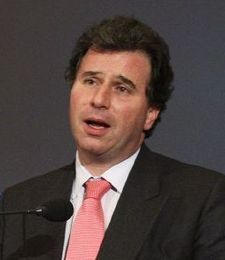 Two modestly hopeful signs from the political world struck me when reading today’s Guardian news. One was the opening of the climate change talks at Tainjin in China aimed at refining possible goals for the Cancun talks in November-December. The comment of Oxfam observer Kelly Dent attracted my attention. Oxfam is a careful watchdog of climate negotiations.
Two modestly hopeful signs from the political world struck me when reading today’s Guardian news. One was the opening of the climate change talks at Tainjin in China aimed at refining possible goals for the Cancun talks in November-December. The comment of Oxfam observer Kelly Dent attracted my attention. Oxfam is a careful watchdog of climate negotiations.
“It was good, I was mildly surprised. At the risk of sounding like an optimist, what I saw today was a willingness to sit down and start working.”
Jonathan Watts’ report notes that the opening day formalities saw none of the histrionics and posturing that marked much of the Copenhagen conference. Expectations among the delegates are considerably lower than they were last year. A comprehensive, binding deal is not expected in Mexico, but some expressed hopes for progress on the protection of forests and the transfer of finance and technology to help developing countries adapt to climate change.
The top Chinese negotiator, Xie Zhenhua, added the possibility of advances on the vexed issue of transparency – how to monitor, report and verify each nation’s emissions to ensure they are honouring their pledges. This question of trust and accounting has been a key difference between the United States and China. Xie said China was trying to move the process along by hosting its first UN climate talks, and expressed the hope that the efforts at the talks would lay a foundation for the Cancun conference.
It remains to be seen how the talks will measure up as the delegates go to work on the negotiating text, but the start appears to hold at least some promise. Watts in conclusion quoted Barbara Finamore, China programme director for the US-based Natural Resources Defence Council.
“It’s very different from Copenhagen. That was a sobering experience that many people don’t want to repeat. There is a real risk that we will lose momentum if we don’t move forward. That is why people have come here to roll up their sleeves and get to work.”
The second political pointer today was from the UK. Oliver Letwin (pictured), minister of state in the Cabinet Office and former shadow Chancellor, speaking at the Conservative Party conference said that green measures which are rumoured to be under threat of budget cuts must be continued because they are part of the coherent whole which underlies David Cameron’s promise that his would be the greenest government ever.
He specifically listed such policies as feed-in tariffs for renewable energy for homes and offices, subsidies for electric vehicles and a green investment bank able to make “massive investment”, alongside other core policies such as energy efficiency and a new high speed railway.
The Guardian report sees Letwin’s comments as a sign that key government figures are still pushing the low-carbon agenda. Although Letwin is not in the Cabinet, he chaired the party’s policy review in opposition, and was part of the team that wrote the party’s 2010 election manifesto.
Interestingly he added some more general observations on strict Treasury cost-benefit rules. Reliance on net present value (NPV) as a way of making decisions would not have led to the building of the pyramids or Chartres cathedral, or “all the things that make life worth living”.
“NPV is an extremely valuable tool for taking short-term investment decisions which are single generational decisions. But the most important decisions society has to make are intergenerational decisions, and those economic and accounting tools we have break down at that point and you’re forced back on much deeper considerations.”
He also criticised modern economics for treating environmental damage as an “externality”, outside core models of costs and benefits. “After all, trashing the planet is bad for business.”
There are clearly tensions within the UK government over possible cuts to green measures, tensions which presumably mirror the relative seriousness with which government members regard climate change. Foreign Secretary William Hague’s recent speech to the Council on Foreign Relations in New York leaves no doubt as to where he stands on the issue.
“The clock is ticking. The time to act is now.
“…the British Foreign and Commonwealth Office, under my leadership, is a vocal advocate for climate diplomacy. All British Ambassadors carry the argument for a global low carbon transition in their breast pocket or their handbag. Climate change is part of their daily vocabulary, alongside the traditional themes of foreign policy. They are supported by our unique network of climate attaches throughout the world.”
It was an outspoken address which advocated action on climate change unequivocally and in convincing detail.
It was also a clear demonstration that climate change is not a politically partisan issue, but a matter of deep human concern which transcends any political divide. In our own country there’s no reason why John Key’s government shouldn’t speak as strongly and in similar terms.
[The Who (astonishing Keith Moon performance)]

Keith Moon had a deserved reputation as one of rock and rolls all time great furniture re-arrangers and is always deserving of recognition but this WHO track provides a more appropriate caption IMO.
I’m saving that one for an appropriate moment… 😉